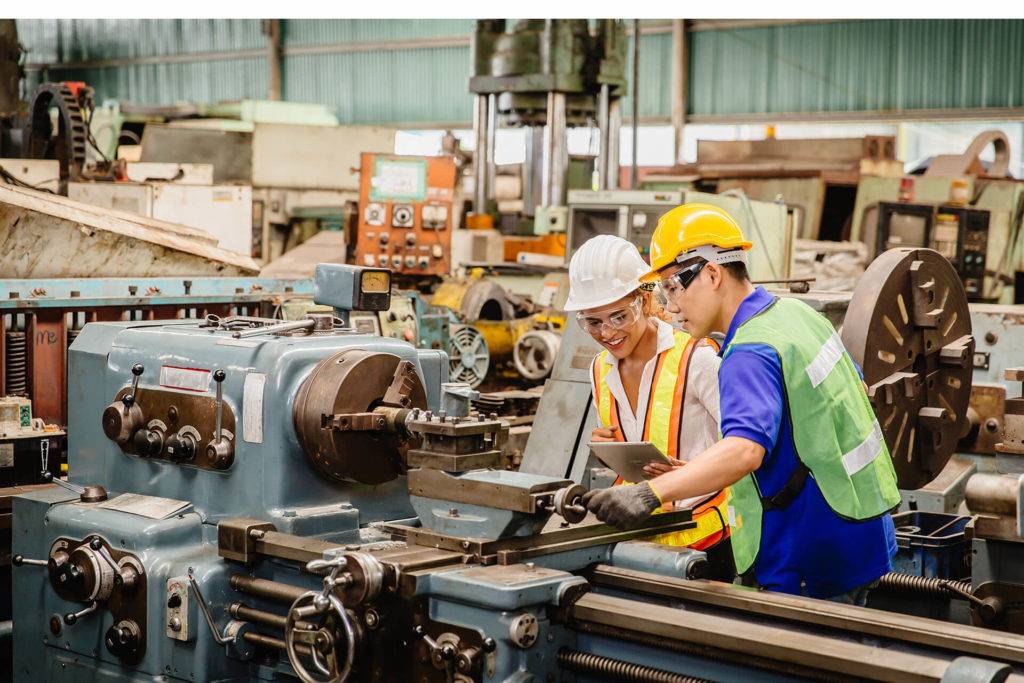All About Machine Operators and Career Opportunities Within Manufacturing and Production Factories
At SURESTAFF, we are dedicated to connecting quality employees with light industrial employers throughout the Illinois, Indiana, Texas, New Jersey, and Wisconsin areas. SURESTAFF staffing agency offers numerous temp-to-hire, temporary and direct hire machine operator job opportunities for those seeking to build a career in the manufacturing/production and light industrial sectors.
Working as a machine operator or machinist, can be a great avenue to building a career in a manufacturing setting. Machine operator opportunities do not always require extensive experience and training is usually provided on the job. SURESTAFF offers numerous opportunities for growth.
With recent, dramatic increases in wages, machine operator jobs are a viable opportunity to a desk job or a general warehouse job. If you cross-train into other positions – forklift, CNC, and logistics – you will have alternatives and can build an impressive resume’ of high-paying, high-demand skills.
Gaining experience and expertise as a machine operator can lead individuals to quality control and managerial positions within manufacturing. Training and courses are also offered by local trade organization, local providers, or local community colleges.
What is a machine operator?
Machine operators, as the title implies, operate various type of manufacturing/production/factory machinery. Operators setup equipment, load materials, and maintain production flows. They also work towards achieving quality checks, perform safety checks and calibrations to ensure that production runs efficiently, smoothly and safely. There are several type of machine operator job opportunities within the light industrial sector.
What are the job roles associated with machine operators and how can it lead me to a career path?
Machine operators possess various qualities including attention to detail, a high level of alertness and deductive reasoning and must be able to actively monitor their work area at all times free of distractions.
Operating machinery involves certain basic knowledge of production processes and manufacturing safety standards and protocols. There are OSHA (Occupational Health and Safety Act) Subpart O safety regulations that pertain to machine operating safety standards. See osha.gov for additional information. Machine operators must follow these safety standards and operate machinery with these standards in mind. There are several job roles associated with machine operators that involve quality control checks and safety checks.
Machine operator roles include setters, packaging machine operators, lathe machine operators, milling machine operators, injection mold operators, rolling machine operators, and CNC machine operators and CNC machinists. Below are specific job functions for each type of machine operator.
Setter machine operators set-up, operate or tend lathes and turning machines to turn, bore, thread, form or face metal materials. Monitor production to ensure quality during the process, and may also clean and perform maintenance on equipment.
Packaging machine operators prepare industrial or consumer products for storage or shipment. Includes cannery workers who pack food products, sort, grade, weigh, and inspect products, verifying and adjusting product weight or measurement to meet specifications. Monitor production to ensure quality during the process, and may also clean and perform maintenance on equipment.
Lathe machine prepare the raw materials for parts manufacturing. Lathe operators utilize blueprints and parts plans to ensure the correct materials are being used. Monitor production to ensure quality during the process, and may also clean and perform maintenance on equipment.
Milling machine operators set-up, operate, or tend milling or planning machines to mill, plane, shape, groove, or profile metal or plastic work pieces. Monitor production to ensure quality during the process, and may also clean and perform maintenance on equipment.
Injection mold operators set-up and operate machines that shape plastic or other materials through a process called injection molding. Setting and preparing machines for each production run. Set-up equipment based on blueprints or design directions. Monitor production to ensure quality during the process, and may also clean and perform maintenance on equipment.
Rolling machine operators set-up, operate, or tend machines to roll steel or plastic forming bends, beads, knurls, rolls, or plate or to flatten, temper, or reduce gauge of material. Monitor production and machine cycles to ensure quality during the process, and may also clean and perform maintenance on equipment.
CNC machine operators set-up and operate CNC machines and equipment, unload raw materials, and prepare a test run to ensure a machine is working properly. Monitor production to ensure quality during the process, and may also clean and perform maintenance on equipment.
CNC machinists, according to uti.edu, require a higher skill set. “The role of a CNC machinist is more advanced than that of an operator. Machinists can accurately machine parts to print using a variety of machines and methods. They rely on their skills and expertise, which are often obtained through an accredited trade school or many years of on-the-job experience.
Some of the additional duties of a CNC machinist include:
- Programming machinery
- Quality control
- Troubleshooting and fixing mechanical issues
- Supervising and managing CNC operators”
What are the requirements for becoming a manufacturing machine operator?
Previous experience in production, manufacturing, assembling environments, and/or previous machine operator is a plus however, not always requires as training may be provided on the job. Prior training or certifications for specific job functions may be necessary. At least one-year experience in a warehouse environment is required. High attention to detail and safety/compliance is mandatory. While most entry-level warehouse positions do not have education requirements, a diploma/GED is usually needed to be considered for a machine operator position.
What is the average salary for a manufacturing/production machine operator?
The average annual salary is $39,000, depending on the position requirements and location of the job. Warehouse jobs in Chicago, for example, have a higher average pay rate because cost of living is higher than surrounding suburbs such as Aurora, DeKalb, Algonquin or Blue Island.
How is performance measured?
A warehouse manager will set specific and personal KPIs (key performance indicators) that will measure job performance such as the production items per man/woman per hour. Volume produced per man/woman per hour. These metrics are usually tracked in real time using an automated system so that managers can access employee and team performance quickly. Other performance measures include adherence to safety standards, attendance, and willingness to work as a team.
SURESTAFF’S career path/growth opportunities for machine operators?
Machine operators in manufacturing/production opportunities can lead to growth and new career opportunities. Training and certifications through entry-level positions can lead to a quality inspector or managerial role. A machine operator associate entry level opportunity can transform into a larger and more diverse role within a warehouse/distribution center. Machine operators are essential to production plants and large manufacturing companies, and help the manufacturing process work. Machine operators are also integral in maintaining equipment and troubleshooting issues within the plant.
Certifications may help propel an entry level associate to a warehouse managerial position. In many cases, warehouse managers need certifications to operate heavy equipment like forklifts and aerial lifts. Certification accreditation requires a combination of a written exam and a practical test.
Machine operator trends 2021 outlook geared towards improving quality of production and safe operation of equipment
Manufacturing and production will continue to transform with advances in IoT and machine learning.
According to an analysis by forbes.com “Sensors, machine learning, computer vision, robotics, cloud computing, edge computing, and 5G network infrastructure – has proven to increase supply chain resiliency for manufacturers who adopt it.”
This will translate to more efficient manufacturing and production outputs that will trickle down to enable the machine operator to become more productive and efficient while the allowing for additional safety protocols to be automatically enacted through AI capabilities.
How to find machine jobs and what you will need to be become a machine operator?
- Previous warehouse experience and/or training preferred.
- High attention to detail and safety/compliance.
- Demonstrate good communication skills, problem-solving skills, and sound judgement.
- Ability to work overtime as needed.
For job opportunities in light industrial, warehouse, or distribution center, please contact one of our locations in Illinois, Indiana, Texas, New Jersey, or Wisconsin or call 1-833-SURE-WORK. Click here to learn more about careers for those who like to work with their hands.

